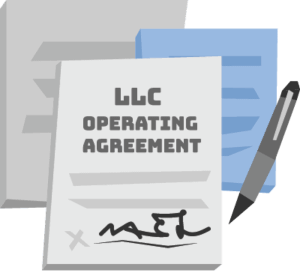How to Create an LLC in Oregon
To start a limited liability company in Oregon, you’ll need to follow these three steps:
- Give your business a name.
- Appoint an Oregon registered agent.
- File LLC formation paperwork along with a $100 state filing fee.
However, to remain compliant and ensure your LLC’s legal bases are covered, you’ll need to do a bit more. Our Oregon LLC guide shows you how to start your LLC in Oregon, and what you need to do to keep it running smoothly.

1. Name Your LLC
Naming your business is the first step of your LLC formation journey. The rules, spelled out in OR. Rev. Stat. § 63.04.9, say your LLC’s name must:
- Include limited liability company, L.L.C., or LLC
- Not include words or abbreviations that suggest it’s another kind of entity, like corp or limited partnership
- Be one-of-a-kind (unique) among business names in Oregon
If you have a great name in mind and are ready to form, check to see if it’s available. Not yet ready to start your LLC? Oregon let’s you reserve a business name for 120 days.
It costs $50 to register a doing business as name (DBA) with the Oregon Secretary of State. A DBA, sometimes called an assumed business name, is any name you do business under other than your LLC’s legal name.
Want us to file your DBA for you? When you hire us to form your company or be your registered agent, you can also have us register your Oregon DBA!
Create Your OR LLC!


2. Claim Your Domain Name
Your domain name opens up a world of options. From launching a website, building social media profiles, setting up email communications, and printing business cards, there’s a whole lot of new-business stuff you can’t do until you choose a domain name.
When you choose your business domain, consider:
-
Does your domain work well with your business name?
-
Is your domain easy to remember and spell?
-
Is your domain available wherever else you want it, like social platforms, trademarks, or business name registries?
Once you have a domain you’re happy with, it’s time to claim it. When you order your domain through Northwest, we’ll also set you up with a website, custom built by our business website experts, hosted and secured through us. You can test drive that website completely free for 90 days.

3. Designate a Registered Agent
All LLCs in Oregon are required to have a registered agent. This is someone (yourself, another individual, or a company like us) designated to accept legal mail on behalf of your business. You’ll need to have your registered agent’s name and address ready before you fill out your Articles of Organization.
The requirements for a registered agent in Oregon are outlined in OR. Rev. Stat. § 63.111. In addition to accepting legal mail on your behalf, your registered agent must:
- Have a physical address in Oregon. (No P.O. Boxes or virtual offices allowed)
- Keep regular business hours (9 AM to 5 PM)
Learn why the pros use a registered agent service.
Yes. You can be your own registered agent in Oregon as long as you don’t mind listing your name and address on the public record. You’ll have to keep regular business hours at this address and be available to accept legal mail in person.
Yes. You can change your registered agent in Oregon anytime by filing the Change of Registered Agent/Office form with the Secretary of State. Changing your registered agent in Oregon is free.

4. Submit LLC Articles of Organization
To officially create your LLC, you’ll complete a form called Oregon Articles of Organization. If you don’t submit this form to the Oregon Secretary of State and pay the $100 filing fee, your business cannot become an LLC. All of the information on this form will become part of the public record.
To complete the Articles, you’ll need to provide the following information:
- Company name: Include an indicator like LLC or something similar.
- Duration: Check a box to signify whether your LLC has a known end date or not. Tip: Most people leave this blank.
- Principal office: This is the physical street address where primary business operations occur.
- Registered agent: This is the person or company designated to accept service of process on behalf of your LLC.
- Registered office: The physical address in Oregon where your registered agent is present during business hours.
- Mailing address: You can use a P.O. Box if you want.
- Management structure: Indicate whether your LLC will be managed by members or managers.
- Professional services: This is only for PLLCs (LLCs that provide a state-licensed service like law or medicine).
- Optional provisions: Anything you’d like to add goes here. For example: Check the box to make your LLC a benefit company and attach supporting documents.
- Organizer: This is the person who is preparing and signing the document.
- Member names and addresses: Members are your LLC’s owners. This step is optional.
- Manager names and addresses: Managers are people hired to run your LLC. This step is optional.
- Individual with direct knowledge: This is a member, manager, or someone else who knows what your business is up to.
- Contact name and phone number: If there’s a problem with your filing, the Oregon Secretary of State will reach out to this person.
It costs $100 to file the Articles of Organization and set up your LLC in Oregon.
Oregon can take anywhere from a day to a week to process your LLC filing once they receive your Articles of Organization. Processing speed depends on how you file.
You can submit your Oregon Articles or Organization online, by mail, or in person.
Mail and in person:
Secretary of State – Corporation Division
255 Capitol St. NE, Suite 151
Salem, OR 97310-1327
Online:
Oregon Business Registry
All names, addresses, and phone numbers you list on the Articles of Organization will be readily available online, making it easier for junk mail to find you and your information to be sold.
Hire us and we’ll list our business address everywhere we can on this form so you can keep your address private. It’s the most effective way to guard your privacy when forming an LLC.
Your Oregon LLC Is Formed. What's Next?

Write an LLC Operating Agreement
An operating agreement is an internal document that specifies, in detail, how your business will be run. It’s the nitty gritty—how much each member invested, how profits and losses are allocated, how voting works, how membership is transferred, and how your LLC will handle disputes.
Oregon doesn’t legally require your LLC to have an operating agreement. That said, it’s vital for your LLC to have a solid operating agreement in writing. Without one, your business will be required to operate according to Oregon’s default LLC statutes.
A solid operating agreement explains how the business will handle big picture situations—everything from allocating profits to dissolving the business. Common topics covered by operating agreements include:
- Initial investments
- Profits, losses, and distributions
- Voting rights, decision-making powers, and management
- Dissolving the business
Contact a lawyer or use our free Oregon LLC operating agreement template.
Yes. You might not need an operating agreement to navigate a disagreement with yourself, but you’ll need an operating agreement to open a bank account and to help maintain your LLC’s limited liability.

Set Up Your Office
No matter what business you’re in, you need some way to organize your mail and correspondence. This could look like a brick-and-mortar office space that you commute to every day. Or it could mean a virtual office that goes with you no matter where you work from.
When you use an Oregon Virtual Office, you keep your business communication professional. Plus, you protect your privacy by separating your personal phone number, email, and address from your business.
Our Oregon Virtual Office service includes a phone line with a local area code, mail forwarding, a unique address at our Portland office, and access to our expert Corporate Guides® for just $29 per month.
Not sure you need the whole office? Try out just Oregon Mail Forwarding, which lets you choose between same-day digital scans or weekly physical mail forwarding to keep your personal address private.

Get an EIN, Bank Account, and Funding
Your Oregon business needs money to operate. Yes, it’s true. And to maintain limited liability and keep the LLC separate from its members, you’ll need to open a business bank account. To do so, you’ll also need to get an EIN, or an Employer Identification Number, unless you have a single-member LLC and don’t mind giving out your Social Security number.
Once your business bank account is formed, it’s time to fund the LLC. Each member should make an initial contribution to pay for their membership interest (percentage of LLC ownership).
You can apply for an EIN directly from the IRS for free. Applying online is the fastest way to get an EIN, but you’ll have to use the paper form if you don’t have a social security number.
When you hire us to form your Oregon business, you can have us apply for your EIN as well.

File Taxes and Reports
Oregon business owners need to be aware of their tax and reporting obligations. Here’s the breakdown:
- Taxes: LLCs in Oregon with default tax classification are taxed as pass-through entities. This means that profits pass through the LLC itself and are distributed to the owners (members), who then report the profits as earnings on their personal tax filings. Profits are subject to the federal self-employment tax rate (15.3%).
- Annual reports: Submitted to the Secretary of State, annual reports ensure the state has updated information on who owns your LLC and how to get in touch with your business. The Oregon Annual Report costs $100 to file. Tired of paperwork? Let us file your annual report for you.
Yes. In Oregon, annual reports are due on the anniversary of when you first filed your Articles of Organization.
LLCs in Oregon are taxed as pass-through entities by default, but they can file paperwork with the IRS to be taxed as an S-corp or C-corp instead.
Learn more about S-corp vs LLC tax designation.
*This is informational commentary, not advice. This information is intended strictly for informational purposes and does not constitute legal advice or a substitute for legal counsel. This information is not intended to create, nor does your receipt, viewing, or use of it constitute, an attorney-client relationship. More information is available in our Terms of Service.
Ready to Start an LLC in Oregon?








